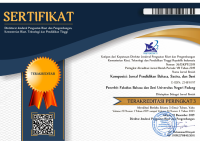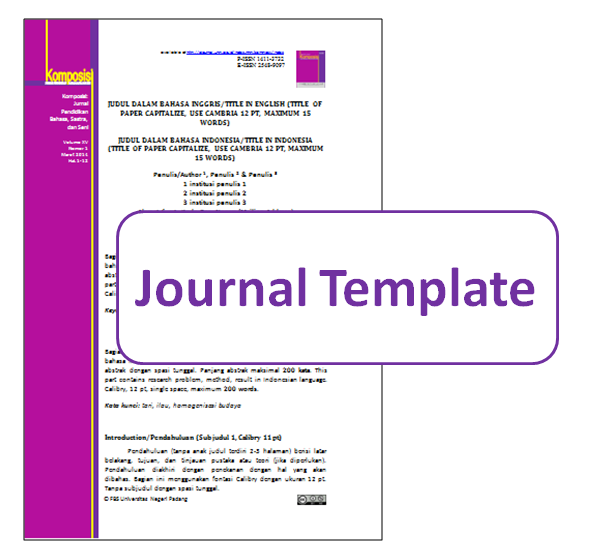Identity in Academic Writing Established by Indonesian vs Non-Indonesian Writers
Abstract
Academic writing in the form of international journal articles is primarily read and used as references for many academic communities. Since the writers of an international journal are from different backgrounds and countries, their works have some differences in terms of writing styles. How the writers show authorial identity and authority through the texts is one of the aspects that causes the differences. This study investigates how Indonesian and non-Indonesian writers established their identities in academic writing. This study used the descriptive qualitative research method. Hyland’s (2005b) stances theory (hedges, boosters, attitude makers, and self-mentions) was applied as the research approach with the help of the AntConc corpus toolkit to analyze the data that were collected from an international journal. The results and discussion show similarities and differences regarding Hyland’s stances in journal articles written by Indonesian and non-Indonesian writers. The results and discussion reveal both similarities and differences in how Indonesian and non-Indonesian writers convey authorial identity and authority through their texts.
Keywords
Full Text:
PDFReferences
Afandi, T., Widiati, U., & El Khoiri, N. (2021). Implementing Semantic Mapping Strategy to Enhance Eleventh Graders’ Organization Aspect of the Writing Skill. J-ELLiT, 5(2), 26–32.
Anthony, L. (2011). AntConc: A learner and classroom friendly, multi-platform corpus analysis toolkit. IWLeL 2004: An Interactive Workshop on Language e-Learning, 7–13.
Doenyas, C., Tunay Gül, Z., & Alcı, B. (2023). A non-Western adaptation of the Situated Academic Writing Self-Efficacy Scale (SAWSES). Assessing Writing, 57, 100763. https://doi.org/10.1016/j.asw.2023.100763
Giltrow, J., Gooding, R., & Burgoyne, D. (2021). Academic Writing: An Introduction (4th ed.). Broadview Press.
Handford, M., & Gee, J. P. (2023). The Routledge Handbook of Discourse Analysis (M. Handford & J. P. Gee, Eds.; 2nd ed.). Routledge.
Hayland, K., Paltridge, B., & Wong, L. L. C. (2021). The Bloomsbury Handbook of Discourse Analysis (2nd ed.). Bloomsbury Publishing Plc.
Hyland, K. (2005a). Metadiscourse: Exploring Interaction in Writing. Continuum.
Hyland, K. (2005b). Stance and engagement: A model of interaction in academic discourse. Discourse Studies, 7(2), 173–192.
Ivanič, R. (1998). Writing and Identity: The Discoursal Construction of Identity in Academic Writing. John Benjamins Publishing Co.
Oshima, A., & Hogue, A. (2007). Introduction to Academic Writing (3rd ed., Vol. 3). Pearson Education Inc.
Paltridge, B. (2012). Discourse Analysis: An Introduction (2nd ed.). Bloomsbury. http://linguistics.paltridge2e.continuumbooks.com
Preece, S. (2018). Identity work in the academic writing classroom: Where gender meets social class. Journal of English for Academic Purposes, 32, 9–20. https://doi.org/10.1016/j.jeap.2018.03.004
Qi, Q., & Zhao, C. G. (2023). Discoursal scholarly identity in research writing. Journal of Second Language Writing, 62. https://doi.org/10.1016/j.jslw.2023.101052
Rahimivand, M., & Kuhi, D. (2014). An Exploration of Discoursal Construction of Identity in Academic Writing. Procedia - Social and Behavioral Sciences, 98, 1492–1501. https://doi.org/10.1016/j.sbspro.2014.03.570
Syahid, A., & Mukminatien, N. (2021). Thirty years of TEFLIN journal: A bibliometric portrait through the lens of microsoft academic. TEFLIN Journal, 32(1), 134–166. https://doi.org/10.15639/teflinjournal.v32i1/134-166
Teng, M. F., & Ying, Z. (2023). Assessing self-regulated writing strategies, self-efficacy, task complexity, and performance in English academic writing. Assessing Writing, 57, 100728. https://doi.org/10.1016/j.asw.2023.100728
Vásquez, C., & Liska, D. (2023). Online Identity and Discourse Analysis. In M. Handford & J. P. Gee (Eds.), The Routledge Handbook of Discourse Analysis (2nd ed., pp. 454–466). Routledge.
Waring, H. Z. (2018). Discourse Analysis: The Questions Discourse Analysts Ask and How They Answer Them. Routledge.
DOI: https://doi.org/10.24036/komposisi.v25i1.127168
Refbacks
- There are currently no refbacks.
Copyright (c) 2024 Komposisi: Jurnal Pendidikan Bahasa, Sastra, dan Seni

This work is licensed under a Creative Commons Attribution-NonCommercial 4.0 International License.
Komposisi: Jurnal Pendidikan Bahasa, Sastra, dan Seni, a peer-reviewed online journal in languages, literature, and arts education.
Printed ISSN 1411-3732, Online ISSN 2548-9097.
Currently, Komposisi: Jurnal Pendidikan Bahasa, Sastra, dan Seni is indexed by:
Published by:
Universitas Negeri Padang (UNP)
Address: Faculty of Languages and Arts (FBS) Universitas Negeri Padang.
Jl Prof. Dr. Hamka Air Tawar Barat, Padang - West Sumatera -Indonesia
Telp/Fax. +62751 7053363
Home page: http://ejournal.unp.ac.id/index.php/komposisi | e-mail:komposisi.fbsunp @ fbs.unp.ac.id | cc: havid_a @ fbs.unp.ac.id
slot resmi
situs toto
situs toto toto slot
Wanita Subang Beli mobil dari Nolimit city
Gatot kaca Buat TKW Jadi jutawan
Rahasia sukses bermain Mahjing wins
rahasia sukses bermain mahjong ways
div>











